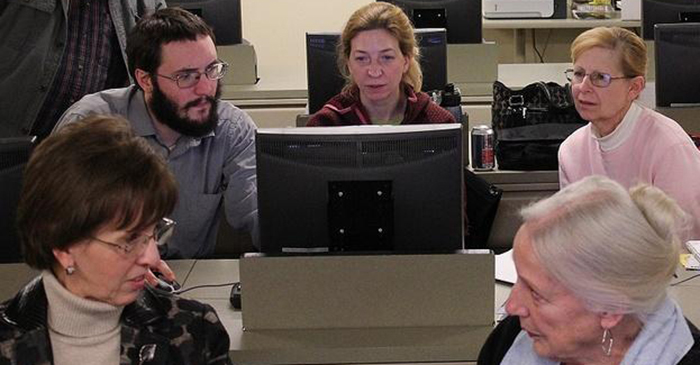Public Libraries – Resources for Personal Archiving Efforts

When Noah Lenstra gave a series of public workshops in various Illinois public libraries on the topic of “Digital Local & Family history,” the workshops yielded a few startling revelations for him.
Like any good educator, Lenstra, a PhD student at the University of Illinois Graduate School of Library & Information Science, wanted to not only share information, he also wanted to observe the participants to see what he could learn from them. So he worked shoulder to shoulder with them, huddled around computers, watching what they did online, and asking questions.
He noticed two striking trends. First, librarians — particularly front-line staff – were hungry for guidance about personal digital archiving. And second, while people accepted his didactic “eat your vegetables” personal digital archiving advice (the kind I dole out all the time), they had already organically developed their own fun approach: they uploaded their personal archives to Facebook to share with their family, friends, and community.
Lenstra realized that Facebook wasn’t the focus though. Rather, the widespread use of it indicated a need and desire for easy-to-use tools that would enable users to stay in touch with people in the present and connect with their past and with others who shared that past.
Connection is the key to understanding this phenomenon. Lenstra said, “People want to make connections between their personal archives and other people’s personal archives, between their history and other people’s histories.” As an example, he cites the popularity of “You know you grew up in (some town) if you remember…” sites, where people tag photos, upload their own and add comments.
Librarians become part of that picture as they get more involved with local history and, by extension, with individual histories. About 25 percent of the attendees at Lenstra’s workshops were public library staff. He gave an example of how one library responded to a local-history need in their community. The library has two scanners for patrons to scan copies from the local official archives. But staff noticed that more and more people were bringing in personal things to scan for their archives. Lenstra said, “The library didn’t plan for this but now it is advertising the scanners as resources for people to digitize family photographs and memorabilia.”
Lenstra plans to meet with library administrators to diagnose what is going on in their libraries and explore ways that libraries can better share resources, serve their community’s digital preservation needs and support local and family history. Perhaps they could partner with other local institutions or act as a community digital repository. Lenstra said, “One library we worked with partnered with the county government, who did all of their IT support. That kind of resource-sharing makes new things possible without draining existing resources.”
However, people should still be made aware of good preservation practices and public libraries could easily provide digital archiving resources and help guide their patron toward helpful sites.
Lenstra said that the public library is the logical place for the community to seek help with their digital stuff. He said, “I’d like to see more public librarians get the support they need. And I’d like to see more public libraries offer services that help people, so people realize they don’t have to do things on Facebook. Libraries can help people understand that there are options or resources in their community to help them preserve their personal digital stuff. I may be idealistic but I’m hoping that, with support, more public libraries can and will help.”
The next “Digital Local and Family History Workshop” is on June 22 in Macomb, Illinois.[1]
[1] University of Illinois Graduate School of Library and Information Science, Community Informatics Research Lab, “Digital Local and Family History Workshop” accessed on May 16, 2013, http://manual.eblackcu.net












